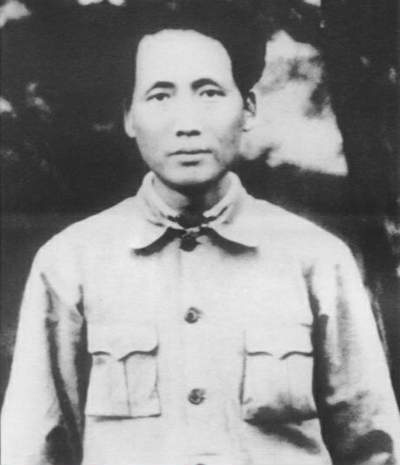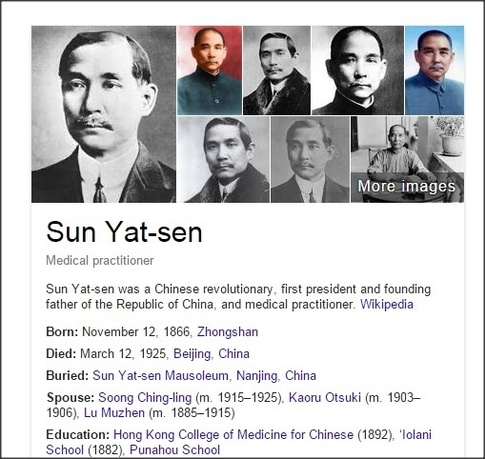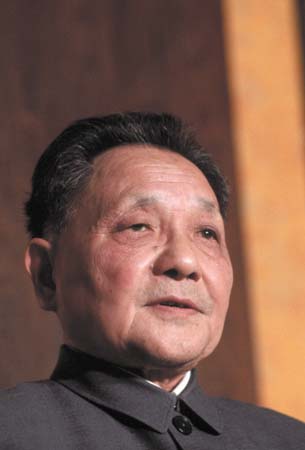
left. Mao Zedong in 1931 at age 38. Looks mixed race.
I'm not saying the 80 million Hakka Chinese are Jews but the similarities are uncanny. First, there have been waves of Jewish migration for 1800 years. These Jews are reported to have mixed with the indigenous race and appear Chinese in every way. The Chinese regarded them as "strangers" who are "clannish." They valued education and were considered a "corrupting influence" when it came to women's role. More importantly they dominated the nationalist and Communist ranks with leaders such as Sun Yat-Sen and Mao Zedong who also were Freemasons.
On the other hand, there is no vestige of Judaism. "The Hakka do not have their own distinct religion, but like most other Chinese, traditionally practiced a blend of Daoism, Buddhism, Confucianism, and "folk" religion, subject to regional variation."
By Mr Liam Ching Liu
(Excerpt by henrymakow.com)
One of the major ethnic groups in China are the so-called Hakka people (客家人, Kejiaren), who account for anywhere between 60 and 100 million people in the world, 90% of which are based in China. One of the distinguishing features of the Hakka people is that they are disproportionately strong represented in the ranks of political leadership both in and outside of China.
Within China alone Hakka political leaders have been the backbone of many uprisings and revolutions, such as the Taiping rebellion (1850-64) and the Communist ascendance to power in 1949. Most previous studies have focused on Hakka politicians and military leaders within China or Taiwan, since that is where most of the Hakkas are located in. And some studies have looked at Hakka people worldwide, but in rather general terms rather than in terms of their political contribution...
There are many examples of famous political leaders, including the leader of the Taiping rebellion, Hong Xiuquan; former president of China, Sun Yat-sen1; former Chinese Communist party chairman, Deng Xiaoping. Outside of China, the Hakkas also had many leaders, including former prime minister of Singapore, Lee Kuan Yew and his son and current prime minister Lee Hsien Loong; former president of Taiwan, Lee Teng-hui; current president of Taiwan, Ma Ying-Jeou; former prime minister of Thailand, Thaksin Shinawatra, and his younger sister and former prime minister, Yingluck Shinawatra; former president of the Philippines, Corazon Aquino, and former president of Guyana, Arthur Chung. There is even a Hakka Supreme Court chief justice, Y.K.J. Yeung Sik Yuen, in the island of Mauritius.

With the rise of the Nationalist (国民党, Kuomintang) government under Sun Yat-sen and Chiang Kai-shek beginning in the 1920s, the relative economic and political disadvantages of the Hakka disappeared. The higher social status of the Punti was diminished through the rise of nationalism and Mandarin as the national language, which created a status above the dominant Cantonese.
Mandarin was about equidistant to both Hakka and Cantonese. With these Hakka gains in place, Punti's public anti-Hakka expressions came to an end, but it did not entirely eradicate Punti resentment. On the other hand, strong Han nationalism has made the official discourse in the country neglect the Hakkas as an important element in Chinese political society, even as it is necessary to prevent blood feuds and ethnic conflicts.
The Hakkas also played an important role in the Chinese Communist Party (CCP, 共产党, Gongchandang), who defeated the Nationalists during the Civil War in 1949 (国共内战, guogong neizhan). Mao Zedong took over with the heavy backing of the peasantry, and enthusiastic Hakka support. Three of the 12 founding members of the CCP were Hakka (considering that Hakkas were about 3% of the total population). The Hakkas were three times as likely to occupy high government and party positions than other Han Chinese. Six of the 9 Communist bases in southeast China were in Hakka counties. The Communists were also able to take advantage of the Hakka women, acting as reconnaissance agents and guerrilla fighters.
Even during the early Republic in the 1920s, many Hakka workers became supporters of the Communists. The Hakka rickshaw pullers from Guangzhou became members of the Communist union. Anarchist unions organized Hakka barbers and tea-house clerks. In Shanghang, Fujian and Anyuan, Jiangxi, mining workers were very militant and organized strikes. They were organized with the help of the Hakka labor organizer Li Lisan.
Many Hakka farmers (80% of the population were peasants) were strongly penetrated by Communist organization. Communism was a popular idea among the Hakka peasants, because it promised land revolution, i.e. a redistribution of land from the Puntis to the Hakkas. Many of the Communist leaders were, in fact, Hakkas. Zhu De, Chen Yi and Ye Jianying were marshalls in the People's Liberation Army (解放军, jiefangjun), which is a rank above general. Zhu De and Ye Jianying were instrumental in the campaign to confiscate and redistribute land for community farming. They mobilized peasants into women's, literacy, health, education and militia programs.

Deng Xiaoping
The most important Hakka leader in the CCP was Deng Xiaoping, who led the country after Mao's death in 1976, and controlled the party at least until 1992. His political success can explain a revival of Hakka studies in the PRC. His background and policies are worth a longer description. Deng was born on August 22, 1904 in Guang'an, a city in the eastern part of Sichuan province. His ancestors can be traced back to Hakkas residing in Mei county in Guangdong, before they undertook the migration to Sichuan 200 years before Deng's birth. Deng's father, Deng Wenming, was a mid-level landowner, who had one wife and three concubines (his wife did not bear him any children). Just like many other Hakkas, who were opposed to Qing rule, Wenming had joined several anti-Qing secret societies to advocate for the downfall of the Qing.
My argument is that the Hakka political leaders were initially political outsiders, but gradually fought their way into power. The Hakkas have struggled particularly hard to succeed economically and politically where they lived, and some of their descendants have been successful in occupying the most important political offices in their respective country....
Culturally speaking, the Hakkas not only spoke their own dialect, but they also observed their own traditional customs. They took up many of the vocations that were despised by the Puntis (the Puntis refer to the native Cantonese people), including barbers, tenant peasants, itinerant blacksmiths, stone-masons, and miners. Because the Hakkas had to toil in poorer land than the native people, they were known for their firm, and strong spirit, bravery in fighting, independence and adventurousness. Their permanent resource conflicts with the Puntis made them develop a very stubborn, insubordinate fighting spirit. They had a strong nationalist sentiment, and resented Manchu rule over China. Hakkas tended to band together, and were known for their clannishness. The round community houses, called tulou, which were also built to facilitate self-defense, attests to this.
In the eyes of the Puntis, the Hakkas were considered as intruders, having alien speech, and outlandish social and cultural practices. Because Hakka women did not receive the then-common practice of footbinding, and were working along the men in the fields, or buy groceries in marketplaces, mixing freely with men, the native Cantonese, who considered the strict separation between the sexes to be crucial, found the Hakka to be corrupting to the society.
The Hakka immigrants in turn felt ostracized by the natives, who were held together by strong kinship, territory and community ties. Pejorative ethnic labeling, the taunting of Hakka women by native men, the lack of permanent tenancy rights for Hakka people, and competition for water and other resources, had kept ethnic tensions high. But as long as the economy flourished over the centuries, the social tensions could be controlled. An economic downturn in the nineteenth century set the stage for political conflict.
Note- Actual Chinese Jews recognizable-
From OL. XVIII, No. 10, ASHINGTON, OCTOBER, I907. National Geographic: THE CHINESE JEWS By Oliver Bainbridge
"A Jesuit missionary, going upon some occasion into the province of Honan, found a considerable Synagogue in the city of Kaifengfu. He soon became acquainted with some of its learned chiefs, who introduced him into their Synagogue and showed him one of the Parchments or rolls of the Pentateuch written in Hebrew, together with the books of Joshua, Judges, Samuel, Kings, some of the prophets, and others containing their liturgy and commentaries they owned. They had lost some of the sacred books and some of their targums or paraphrases. This loss was caused by a violent overflowing of the great river, which had laid the capital wholly under the water and had damaged their Torah, or roll of the Pentateuch, and upon which they ordered twelve new copies to be taken from it.....
My elder brother -- I am not yet forty years old, but I have thought and talked much with my friends about our ancestors, who were rich and numerous and who worshiped in a fine synagogue, built on the land presented to them bv the Emperor Tai-tsti. This synagogue, you know, has been swept away by 'China's Sorrow' [the Yellow River]. Our ancestors came to this land from the northwest nearly three thousand years ago...."






Peter said (November 12, 2015):
Chinese president Xi Jinping is a Hakka.